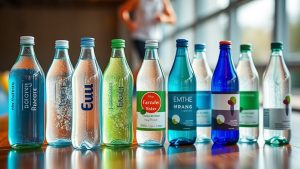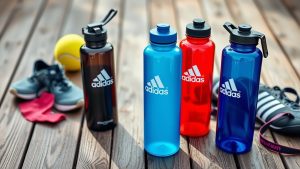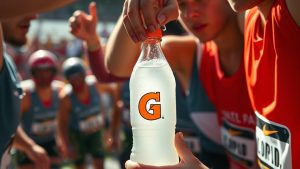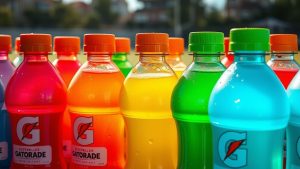
When choosing between Prime and Gatorade, consider factors like calorie and sugar content, electrolyte composition, and nutritional ingredients. Gatorade offers a quick energy boost with higher sugar and a wider flavor range, while Prime provides lower sugar, natural ingredients, and additional vitamins, making it suitable for health-conscious consumers. Gatorade excels in high-intensity training, while Prime caters to casual workouts. Exploring these distinctions can help you find your ideal hydration solution. More insights await you.
When it comes to hydration solutions, Prime and Gatorade stand out as two popular choices for athletes and fitness enthusiasts alike. Gatorade, created in 1965 by Dr. Robert Cade at the University of Florida, has established itself as a staple in the sports industry. In contrast, Prime, launched in 2022 by social media stars Logan Paul and KSI, quickly gained traction as a healthier alternative. While both brands target athletes, Prime appeals more to consumers looking for natural ingredients and lower sugar content.
Both drinks contain around 80 calories per 12 fl oz serving, but their sugar contents differ considerably. Gatorade packs 21 grams of sugar, while Prime has only 12 grams. This lower sugar content makes Prime an attractive option for those seeking sustained energy without dramatic spikes in blood sugar. Gatorade, on the other hand, uses higher sugar levels to provide immediate energy boosts, making it suitable for high-intensity athletes.
Prime offers 12 grams of sugar for sustained energy, while Gatorade's 21 grams deliver quick boosts for high-intensity workouts.
In terms of electrolytes, both drinks aim to restore fluid and electrolyte balance during exercise. Gatorade features a mix of sodium and potassium, which is essential for rapid hydration. Prime also offers electrolytes but with a more balanced sodium level and higher potassium content—90 mg compared to Gatorade's 45 mg. Notably, Prime includes calcium as well, which Gatorade lacks, adding another layer of nutritional benefit. The electrolyte balance in both drinks is crucial for preventing dehydration during physical activities.
Nutritionally, Prime positions itself as an all-natural product, incorporating ingredients like coconut water. Gatorade, however, contains artificial additives such as food dyes, which some consumers may prefer to avoid. Additionally, Prime offers vitamins C and B12, enhancing its appeal as a healthier choice. These differences in ingredients highlight the distinctive approaches each brand takes in catering to consumer preferences.
When it comes to flavors, Gatorade has a wider variety to choose from, appealing to a broader audience. However, Prime introduces unique flavors aimed at younger consumers, enhancing its market presence. Taste can be subjective, and individual preferences will often guide your choice between the two.
Both drinks have their unique advantages depending on your fitness needs. If you're engaged in casual workouts or looking for a healthier hydration option, Prime may be more suitable. For high-intensity training sessions where rapid hydration is essential, Gatorade's higher sodium and sugar levels could better meet your demands.
Finally, while both Prime and Gatorade enhance performance during physical activity, they do so in different ways. Prime includes a blend of branch-chain amino acids (BCAAs) for additional benefits, catering to those focused on sustained energy and recovery. Gatorade's formula is designed for quick replenishment during intense exercise.
Conclusion
In the battle of Prime vs. Gatorade, knowing the key differences can help you make the right choice for your hydration needs. Whether you're hitting the gym or just need a revitalizing drink, it's crucial to pick one that aligns with your activity level and goals. Remember, "you are what you eat"—or in this case, drink! So choose wisely and stay hydrated to fuel your body effectively for peak performance.



